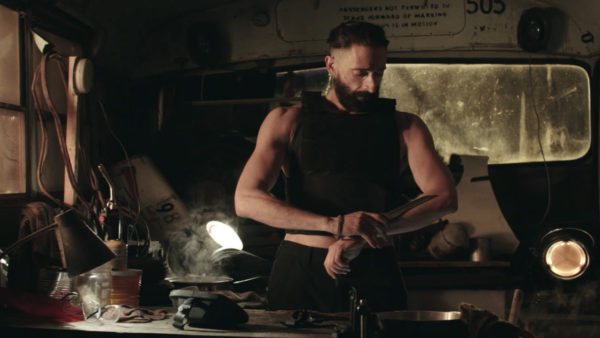
What happens when you take the race and class politics of a 70s & 80s Charles Bronson revenge thriller and cross it with a touch of John Wick? You get Paul Solet’s Clean.
Clean is both the name and the lifestyle by which Adrien Brody’s recovering addict character goes by. He’s a man of few words and an even simpler life: he works on his souped up car, meets with his sponsor (Mykelti Williamson) trades items with Kurtis (RZA), the pawn shop owner, and keeps a protective eye on his neighbour Dianda (Chandler Ari Dupont), whose caretaker Ethel (Michelle Wilson) is also in recovery.
When Dianda ends up at a party with unsavoury types, including Mikey (Richie Merrit), the golden boy of a local crime lord, Clean steps in to protect her. In the process, Mikey finds himself on the wrong end of Clean’s hammer. This sets off a chain reaction: Mikey’s father Michael (Glenn Fleshler) puts out a hit on Dianda and Ethel in retribution, and Clean is forced out of (criminal) retirement to keep them safe.
There’s a disconnect at the center of Clean, however. The film is oddly displaced from space and time, employing a variety of throwbacks to revenge thrillers from the 1970s and 80s (the film is set in the present). This makes for an uncomfortable viewing experience as outdated tropes appear without consideration of how drastically the world has changed. This includes Clean’s role as a white saviour to his Black neighbour (who is less of a character than a proxy for his dead daughter) and, more significantly, the use of racist stereotypes.
The criminal hierarchy in the film features a white drug dealer at the top; Michael lives in a palatial home with his silent, suffering wife and commands an armada of goons. These henchmen – several of them contract killers, but also individuals from the low-income neighbour – are primarily Black. Few, if any, have names, discrete personalities or exist to do anything other than intimidate, curse at Clean and die.
Still, these characters are more memorable than the Chinese drug suppliers that Michael is in business with. Not only are they first referred to via racist slur, but early in the film their leader is executed in an extended gory sequence. The other men are never seen or heard from again, confirming that these scenes are only present as character development for the white villain – which is exactly what Dianda and Ethel are to Clean. The film is content to trot out racialized bodies who exist solely to be protected or murdered; these aren’t characters, they’re just stereotypes.
The issue is that Clean is so self-serious. Were it a playful send-up or a meta-textual commentary on these outdated tropes (rather than a straight-up homage) these elements might go down easier. As it stands, even when the film is delivering exciting action sequences, good direction, and a surprisingly on-point score (also courtesy of Brody), there’s no escaping how antiquated Clean is. Add to this a ponderous voice-over filled with film noir philosophical musings about life and redemption and there’s more working against the film’s favour than for it.
The Bottom Line: Clean boasts several great violent set pieces, including one at a diner/bowling alley and another at Michael’s estate, but these sequences alone can’t resuscitate a film that plays like it’s been trapped in amber for forty years.
Modern audiences have John Wick; they don’t need Clean. 1.5/5
Clean played at the 2021 Tribeca Film Festival.